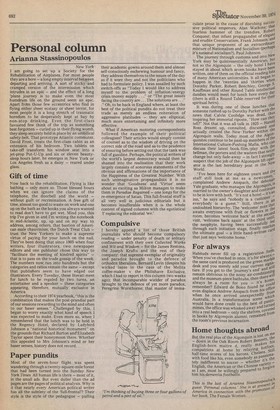Paper pundits
Most of the seven-hour flight was spent
• wandering through a twenty-square-mile forest that had been turned into the Sunday New York Times. All human life is there — most of it, in the small ads. But even duller than the ad pages are the pages of political analysis. Why is it that nearly every American political writer has all the subtlety of the 'full-frontal'? Their style is the style of the pedagogue — pulling
their academic gowns around them and almost self-consciously eschewing humour and fancy, they address themselves to the issues of the day as if it were they and not the politicians who had to formulate policy. I was assailed by such switch-offs as "Today I would like to address myself to the problem of inflation/energy crisis/money supply . . ." or "The great issues facing the country are ... The solutions are ..." ." Oh, to be back in England where, at least the best of the political pundits do not treat their trade as merely an endless reiteration Of aggressive platitudes — they are elliptical, much more entertaining and infinitely more effective.
What if American motoring correspondents followed the example of their political colleagues? Their articles would simply consist of counsel as to the wisdom of driving on the correct side of the road and as to the prudence of ensuring before setting out that the tank was full of gasoline. Perhaps, the political writers of the world's largest democracy would then be shamed into the realisation that their work largely consists of sonorous statements of the obvious and affirmations of the importance of the Happiness of the Greatest Number. With such unimaginative propagandists it is no wonder that 'Goodness' and 'Virtue' seem about as exciting as Milton manages to make them in Paradise Regained — one longs for the re-emergence of Satan. This full-frontal stuff is all very well in judicious editorials but it becomes insufferable when it is the whole content of signed columns with the egotistical 'I' replacing the editorial 'we










































 Previous page
Previous page